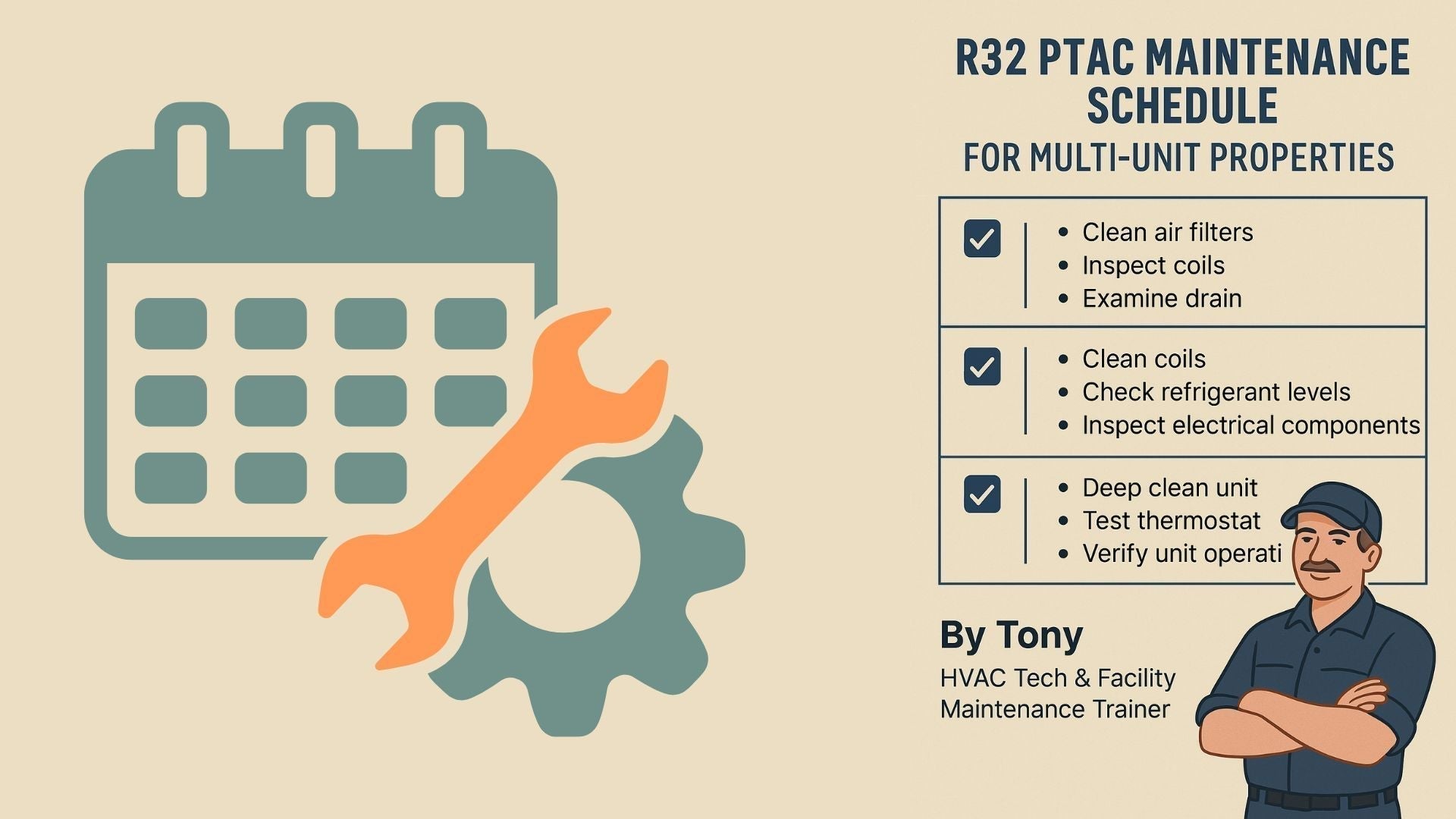🏢 Why Maintenance Matters (Especially in Multi-Unit Buildings)
Whether you’re running a hotel, apartment complex, senior living center, or dorm, keeping dozens (or hundreds) of PTAC units running smooth isn’t just about comfort — it’s about budget, compliance, and guest satisfaction.
R32 PTACs are efficient and long-lasting, but they need regular attention to stay that way. Here’s a full maintenance schedule I’ve used with property managers for years, now adapted for R32 units.
🧾 Quick-Glance Maintenance Timeline
| Task | Frequency | Responsibility |
|---|---|---|
| Clean/replacement of air filter | Every 30 days | Maintenance tech / staff |
| Inspect coils & blower wheel | Every 3–6 months | HVAC technician |
| Check for refrigerant leaks | Every 6 months | EPA-certified technician |
| Electrical inspection | Annually | Licensed electrician |
| Clean condenser (outdoor) grille | Twice a year | Maintenance team |
| Test thermostat & controls | Every 6 months | Maintenance technician |
| Deep clean (full teardown) | Annually | HVAC technician |
🧹 Monthly: Filter & Visual Check
✅ Task:
-
Remove and rinse washable filters or replace if disposable.
-
Check unit faceplate, buttons, and display for damage.
-
Ensure guests/residents aren’t blocking airflow with curtains, furniture, etc.
🧰 Tony’s Tip: I use colored zip ties on units when I clean the filter — makes it easy to spot what’s been done.
🧼 Quarterly: Coil Check & Drain Inspection
✅ Task:
-
Open the front panel and inspect evaporator coil for dust buildup or mold.
-
Check blower wheel for hair or debris (especially in pet-friendly or extended-stay properties).
-
Inspect the drain pan and drain line — flush with vinegar if needed.
💡 Catching drainage issues early prevents mold, odors, and wall damage — a big one in multi-unit buildings.
🧪 Semi-Annually: Function + Refrigerant Check
✅ Task:
-
Run the unit in all modes (cool, heat, fan).
-
Test thermostat or remote control for responsiveness.
-
Check refrigerant line temperatures with an IR gun.
-
Use an to scan for small refrigerant losses.
🔍 Reminder: Even R32 systems lose charge slowly over time. A minor leak now can turn into a non-cool call in July.
⚡ Annually: Full Service & Component Test
This is where the pros come in. For your annual PM, schedule a licensed HVAC tech to:
-
Deep clean blower wheel, evaporator, and condenser coils
-
Test capacitor (µF reading), relay, and control board voltages
-
Remove and reseal unit perimeter if needed
-
Verify refrigerant pressures and recharge if required
-
Check and tighten all electrical connections
📋 I also document serial numbers and refrigerant charge levels — it helps if warranty claims or future replacements come up.
🛑 When to Flag a Unit for Replacement
During annual checks, I recommend tagging a unit if:
-
Compressor is short-cycling or overheating
-
Rust or corrosion is present on coils or chassis
-
Fan motor bearings are noisy
-
Repeated leak repairs (2+ times) have been done
-
Unit is over 10 years old and showing signs of inefficiency
🧠 Tony’s Rule: If you wouldn’t trust the unit in your own living room — it’s time to swap it out.
The Furnace Outlet’s R32 PTACs make replacements fast, affordable, and low-hassle.
📎 Bonus: Maintenance Log Template
Create a simple spreadsheet or binder with:
-
Unit number/location
-
Date of last filter clean
-
Notes from last inspection
-
Upcoming service due
-
Technician initials
🧰 I’ve seen this one tool reduce HVAC complaints in hotels by 80%. A clean record beats a last-minute panic call any day.
🔁 Final Word
R32 PTACs are built for the long haul — but only if they’re maintained with intention. If you’re managing 10+ units, having a routine schedule keeps your property efficient, your rooms comfortable, and your costs predictable.
Need help building a maintenance SOP or ordering replacement parts in bulk? I’ve helped dozens of facilities get their systems running like clockwork — just reach out.







